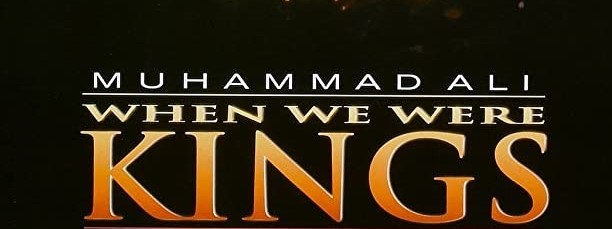Starring: Muhammad Ali, George Foreman, Don King and Norman Mailer
Rated: R Documentary/Sport
While many are familiar with the animosity between Muhammad Ali and George Foreman that played out before the world as the “Rumble in the Jungle”, When We Were Kings presents the complicated and inspiring conditions that brought the international boxing event together.
Occurring on October 30, 1974, at the Stade du 20 Mai in Kinshasa, Zaire (presently known as the Democratic Republic of the Congo) the event is much more than a battle between the heavyweight champion, Ali, and a ferocious boxer, Foreman, on the rise.
It is the return to the ring of Muhammad Ali, whose license to box had been suspended by the New York State Athletic Commission and championship title had been stripped from him by the World Boxing Association. In 1966, Ali, as a conscientious objector, was punished for his refusal, based on his religious beliefs, to be drafted into the U.S. military during the Vietnam War. He was barred from every state in gaining a boxing license and his passport was taken. As such, Muhammad Ali was unable to professionally box from 1967 to 1970, from 25 years old to almost 29 years old, as he appealed his conviction, which was overturned in 1971.
In When We Were Kings, viewers learn of the finagling, delays, celebrations and even the rumor of a spell that is placed on Ali. Ali, who is thirty-two years old, shows his Pan-Africanist respect and love for the indigenous Africans and his sentiment is joyfully returned. This is readily juxtaposed to the arrival of and reception to the twenty-two-year old Foreman.
Each man was offered $5 million dollars (est. $27 million USD in 2019) by Don King at the beginning of his professional career of promotion. However, the attainment of funds was considered highly unethical by many, as the monies King secured were from Mobutu Sese Seko, the dictator of Zaire. In the film, it is alleged that cells underneath the stadium where the match was held had to be cleansed and sanitized, as they were said to have held prisoners who had been tortured and even murdered.
The government of Mobutu had to ensure the capital’s infrastructure could support such a global event, for the boxing match would draw more than sixty thousand people in attendance. However, it also had to have this support because of the musical festival it would host. The festival, called Zaire 74, featured Black musical greats, including The Crusaders, Miriam Makeba, The Spinners, B.B. King Bill Withers, “The Godfather of Soul”, James Brown, and his band, The J.B.’s. The musical festival occurred six weeks before the match. Snippets of these artists arriving and performing can be seen in When We Kings; a more detailed viewing of this international musical event can be seen in the 2008 documentary, Soul Power. This documentary, comprised of archival footage, showcases the Zaire 74 music festival that accompanied the boxing match. Artists in this film about the festival also starred the Fania All-Stars featuring Celia Cruz, Manu Dibango, the Pembe Dance Troupe and the Orchestre Afrisa International featuring Tabu Ley Rochereau.
The boxing documentary contains original film footage and images of Ali, Foreman, King, Mobutu and many others affiliated with the event. Completing the film are contemporary interviews, including with film director, Spike Lee; journalist and author Thomas Hauser; and sports journalists, George Plimpton and Norman Mailer, who were in attendance at the “Rumble in the Jungle”. These guests provide further insight into each boxer, the match, Zaire, democracy, imperialism, freedom and Black power.
Hailed as one of the greatest documentaries on boxing ever made, When We Were Kings won the 1996 Academy Award for “Best Documentary Feature”. Nominated for the NAACP Image Award for “Outstanding News, Talk or Information – Special” and the “Grand Prix” of the Belgian Syndicate of Cinema Critics, the documentary was overwhelmingly praised by film critics, including Roger Ebert, Edward Guthmann and Lisa Schwarzbaum.
In her review, Schwarzbaum raved, “The Ali who knocked out Foreman, wonderfully captured in finely chosen swatches of film, was beautiful, charming, self-confident, articulate, and burning with talent in his prime. But When We Were Kings expands on the greatness of two athletes in fierce competition to capture the dizzy excitement of the event: for the Africans who sang and cheered and chanted ‘Ali, Boma ye!’ – in other words, ‘Ali, kill him!’ – happily responding to the exhortations of the charismatic underdog; for swaggering fight promoter Don King, who bet on the success of the event to make him even more famous; for the electrifying Black American musicians (including James Brown and B.B. King) who traveled to Zaire to put on a show and make a statement about Black pride; and for the sportswriters who recognized in the showdown one of the defining moments in human athletic contests.”
In 1997, a soundtrack to the film was released and also was well-received. It featured live performances from artists, such as Brown, King, the Jazz Crusaders and the Spinners, from the music festival held in Kinshasa as well as words from Ali and his trainer, Drew “Bundini” Brown. When We Were Kings also contained new material from modern artists, Zelma Davis; a duet between Diana King and Brian McKnight; and a collaboration between Busta Rhymes, A Tribe Called Quest, Forte and The Fugees.

